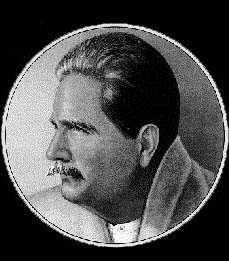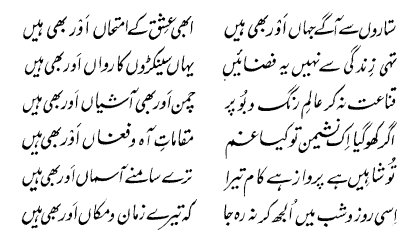yeh tai paayaa gaya hai ki march ke baqaayaa dinoN ke liye aur poore maah e apra'il ke liye muntaKHib shaa'ir hoNge hamaare barr e saGheer ke shaa'ir shaa'ir-e-mashriq aur mujaddid e islaamii shaa'iri janaab e MoHammad Iqbaal marHoom o maGhfoor [r.a.] hoNge.
aap sab Khawaateen o Hazraat se iltimaas hai ki aap is azeem shaa'ir ko Khiraaj e aqeedat pesh karte huye baRh chaRh kar Hissa leN aur ziyaada se ziyaada unkaa kalaam hamaare saath share kijiiye.
shukria...
Allah haafiz
Hashmat
_____________________________________________________________

The facts of Iqbal's life can be briefly stated. He finished his early education in Sialkot and migrated to Lahore in 1895 for higher studies. In Sialkot he was lucky to have as his teacher Shamsul-Ulema Mir Hasan, a great Oriental scholar. This great man did not take long to recognize the perspicacity of his young pupil's intellect, and encouraged him in every possible way. At Lahore, Iqbal came under the influence of Sir Thomas Arnold. Sir Thomas Arnold's company introduced him to all that is best and most noble in Western thought, and at the same time initiated him into the modern methods of criticism. Iqbal graduated from the Government College, Lahore , in 1897, with English Literature, Philosophy and Arabic. In 1899, Iqbal took his M.A. degree in Philosophy. As advised by Sir Thomas Arnold, Iqbal went to Europe for higher studies in 1905 and got his Doctorate in Philosophy from Munich University in 1908 . Iqbal also qualified for the Bar in this interim. The Governor of Punjab, impressed by Iqbal's poem on the death of Queen Victoria, conferred knighthood upon him in 1922.
In Europe, Iqbal began to see the larger horizon of things and to move in spacious realms. He stayed there for three years, and these years played a great part in the development of his thought. It was not a period of deeds but one of preparation. His outlook on life underwent two important changes about this time: he got a n utter dislike for narrow and selfish nationalism which was the root cause of most political troubles in Europe, and his admiration for a life of action and struggle became more pronounced.
One simply cannot set a definition on Iqbal, as he was able to convert everything in poetry. There is no subject he hasn't debated upon in his poetry: Politics, life, love, religion, philosophy, literature, West, East, countries, legends, history, etc. The list is longer as one goes deeper and deeper in Iqbal's poetry - not least discovering that Iqbal beheld the true meaning of poetry, whereas his ambitions and abilities to move the masses were yet still indiscussable subjects. There was never any doubt why he got the title: "Shayer-e-Mashrik" - the Poet of the East.
To the Indian nationalist he appears a fervent nationalist who wrote, `Of all the countries in the world, the best is our Hindustan' (sarey jahan se achcha Hindustan hamara), exhorted Hindus and Muslims to come together, build new shrines where they could worship together and who regarded every speck of dust of his country as divine. Iqbal exhorted the peasantry to rise against its oppressors, uproot the mansions of the rich and set fire to crops which did not provide sustenance for them.
It could be said that Iqbal sang in many voices: he was a nationalist as well as an internationalist, a Marxist revolutionary as well as a supporter of traditional Muslim values and a pan-Islamist. Whatever he wrote was born of passion and executed with the skill of a master craftsman. Few poets of the world have been able to cram so much erudition and philosophy in verse; and fewer still use words both as colors on an artist's palette to paint pictures as well as deploy them as notes of a lute to create music. He was fired by a creative zeal which could only be explained as divinely inspired. Three years in Europe (1905-1908) brought about a complete reversal in his beliefs. The world became real; life had a purpose to serve; latent in every man was a superman who could be roused to his full height by ceaseless striving to create a better world. This post-European phase has been designed as Iqbal's philosophy of khudi. As used by Iqbal what comes closest to khudi is assertive will-power imbued with moral values. This is apparent from these oft-quoted lines:
That at every turn of fate it so be
That God Himself asks of His slave
'What is it that pleases thee?'
Conviction that his cause is just;
Resolution to strive till eternity;
Compassion that embraces all humanity.
The sea of your life is placid, its waves devoid of tumult.
That every morn and eve its fortunes change.
In heavens there are designs for thy ruin.
See that which is happening and that which is to happen,
What is there in the stories of olden times?
If you fail to understand this, you will be exterminated, O people of India!
Even your story will not be preserved in the annals of the world!





